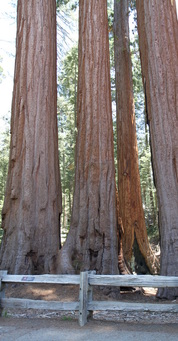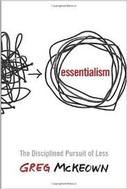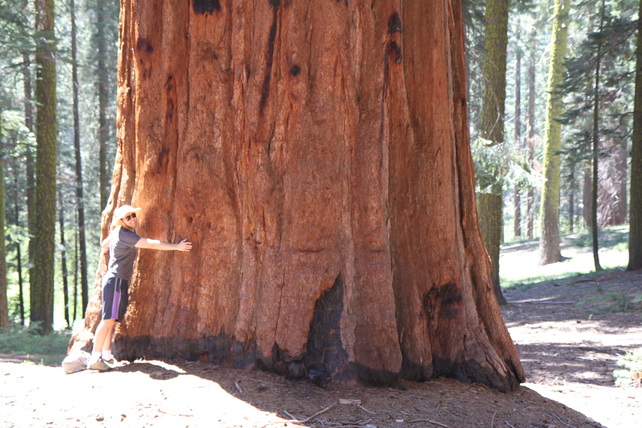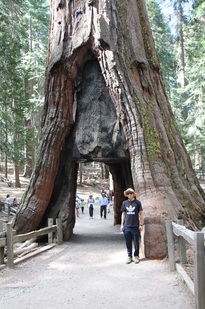|
Last month I was lucky to visit the Sequoia, Kings Canyon, and Yosemite National Parks for the first time. It was relaxing, educational, and fun. And I learned a thing or two from the trees. 1. Certain things have been here way longer than modern man and have survived through thick and thin; this should give our lives perspective. The giant sequoia trees I saw were literally thousands of years old. The General Sherman Tree, the largest known tree on Earth, is 2,500 years old. These trees have lived through all the major wars of history, enormous natural disasters, and huge changes in climate and civilization around them. Compared to that, what is our relative importance? What can we learn from their survival? 2. A giant sequoia comes from a tiny cone. In the picture above, the cone for the giant sequoia is the small egg-shaped one, whereas the other cones that are much bigger come from (eventually) much smaller trees like pine. This goes to show that you can't judge one's full potential from one's modest beginnings and that sometimes the biggest things come from the humblest starts. 3. Sequoias need fire to live and grow. Fire is necessary for their survival and replication. At one time firefighters stopped forest fires too early, and this harmed the tree population; now they know the importance of allowing natural fires to do their work. Fires increase the temperature of the cones that fall from the tree, which burns away the outside and activates the seedlings inside to allow reproduction.  4. Sequoias help each other out. They grow deep roots underground and share water with each other. This is how they are able to survive extremely long periods of drought. 5. People tried to cut down giant sequoias that grew for thousands of years for their wood, just to discover they weren't really usable for that purpose. How do we avoid such mistakes in the future?
0 Comments
Back in March, I hosted Marc Goodman at Google LA for an Authors@Google talk. Marc is a global strategist, author and consultant focused on the disruptive impact of advancing technologies on security, business and international affairs. He discussed the his new book Future Crimes: Everything Is Connected, Everyone Is Vulnerable and What We Can Do About It. It was scary and eye-opening and really made me wonder about unintended impacts of exponential technologies.  I just finished reading a book that Noah Kagan recently recommended, Essentialism: The Disciplined Pursuit of Less by Greg McKeown. I heard about it on Tim Ferriss's podcast. The book was a pretty straightforward read. I found it a bit lacking in depth and non-obvious examples. The writing was good, as were the stories, but I was looking for more of a philosophical angle. I also think the book could've been more concise. I do like the core ideas of focusing on the one biggest thing at a time, saying no to everything that you're not 200% excited about, and spending time with the family and friends that will make life meaningful as opposed to email or other non-essential things that can keep us busy. Below are my notes and main takeaways. 1 the essentialist Ignore everything except what is essential Refuse all other requests and be honest Is this the very most important thing I should be doing with my time and resources right now? If not definitive yes then say no. Let others handle email conversations instead of jumping in first Stop attending meetings unless have construction Less but better Choosing right activities first If you don't prioritize your life someone else will Undisciplined pursuit of more Explore and evaluate Eliminate Execute Myths: I have to, it's all important, I can do both Truths: I choose to, only a few things really matter, I can do anything but not everything 2 choose Stop straddled strategy Choice is an action not a thing. We are always choosing. We forget our ability to choose. Learned helplessness. 3 discern More effort doesn't always yield better results Almost everything is nonessential Scan environment for vital few 4 trade off What can I go big on? No solutions, just trade offs 5 escape If too busy to think then too busy Solitude required for serious work Deliberate distraction free time and space to sit and think Space to read Think week 6 look Listen for what's not being said Keep a journal Review every 90 days at high level for patterns 7 play Animals who play more survive better Required for cognitive development 8 sleep Protect the asset 9 select Is this something I absolutely love and want to do or have Only do things that are 90% right Be very selective Make criteria selective and explicit 10 clarify Decide on essential intent Inspirational and concrete 11 dare: power of graceful no The main thing is to keep the main thing the main thing Separate the decision from the relationship Consistently saying no Own the awkward pause; Count to 3 Soft no: no, but (do it later) Let me check my calendar and get back to you Use email bounce backs Yes, what should I de prioritize? Humor You're welcome to X but I'm not willing to Y Slow yes and quick no 12 uncommit: cut losses quickly Beware of endowment effect and sunk cost fallacy Pretend u don't own it yet. How much would I pay to buy this or how hard would I work to get on this project? 13 edit Cut out options Condense 14 limit 15 buffer 16 subtract What is the limiting constraint or obstacle 17 progress: small wins Done better than perfect Minimal viable progress Minimal viable preparation Visually reward progress 18 flow and routine 19 focus: what's important now 20 be Appendix Focus Less but better Clarity Very selective in hiring |
Archives
June 2024
Categories
All
Subscribe |



 RSS Feed
RSS Feed
